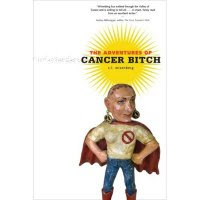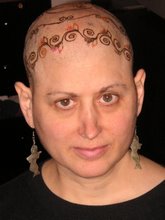If you are under 50, skip this; don't worry your pretty little head.
Good news: The two polyps the doc removed yesterday are adenomas, pre-cancerous, benign.
Bad news: I need another colonoscopy in two years, same preparation (2-1/2 days of liquid diet, plus the nasty stuff to drink). Which falls in the "If we can put a man on the moon" category: Then why can't we figure out a less yucky way to investigate the colon?
Is this a cave painting or a stranger's polyp?
This just in: Dense Breasts Will Protect Your Haid
Yes, it's true. I got this brochure at Fancy Hospital. Note the smiling woman on the bicycle. She's on a bike, not wearing a helmet, and presumably has dense breasts. Therefore, dense breasts must somehow protect your head so that that you don't need a bike helmet. I mean, how could you look at the photo
& come to any other conclusion??
Brochure is from American College of Radiology & Society of Breast Imaging
& come to any other conclusion??
Brochure is from American College of Radiology & Society of Breast Imaging
Death
I met our friend in the 1980s because I had gone to the Writers' Workshop in fiction at the University of Iowa and he was thinking of going and got in touch with me because I was a friend of a friend and he wanted to know what it was like. He ended up studying in the nonfiction program down the hall from fiction and poetry, and when he returned he wrote columns for the Tribune, where he had worked before Iowa. I knew of him way before that because he had been married to the rich and headline-grabbing Abra Prentice, and a college friend had been Abra's summer girl--a domestic, seasonal au pair. (Groceries were delivered to their high rise! she told me. This was in the 70s, I think.) Prentice was known for sending a Christmas card to her friends that showed a picture of her and children, unclothed.
But now he was married to a Tribune writer turned filmmaker, and we got together, as I said, every once in a while. He was a storyteller and was amused and interested in much. He delivered bons mots such as, Everyone's story is interesting as long as you know what to cut. We went to the premiere of his wife's film and to a reading his daughter had in town from a new novel that was a roman a clef, and they came to our house Labor Day weekend and maybe that was the last time I saw them. Could it have been? I have felt sad today because I feel deprived, that I will never be around him again. I wanted so much to go to the wake but it didn't seem right to likely infect the crowd, it seemed indulgent, because I was sure there would be Public Chicagoans telling stories about him, the way he used to tell stories about everything, though it would be sad because Roger Ebert his good friend wouldn't be there, and would drive home the point that Ebert was gone, and Siskel, and Mike Royko and Studs Terkel, and Carlos Cortez, David Hernandez and so many others who have made Chicago Chicago. I read After Visiting Friends by Michael Hainey, whom I once knew, and whose uncle Dick I knew, and besides tracking down the mystery of his father's death, Hainey the Younger brought back the Old Days of Chicago Journalism, when (mostly) men smoked and drank harsh drinks on the rocks in the Billy Goat and other bars, and told stories and slapped backs and got drunk telling of escapades and then had more of each--drinks and escapades. I came of age as a college journalist just after Dick Hainey's Chicago Today died and he became a journalism professor at his alma mater, which became mine. What I remember most from being in his class was that the main headline should be about the topic that concerned the most of your readers (back when newspapers had readers), so that a severe snow storm would top the list. Later, when I taught there too, he told me about his lecture style. At the end, he would say to the students in the auditorium: And now, I will snap my fingers, you will open your eyes, and remember nothing.
So now about the only Real Chicagoan left who can talk about the Old Days in Rick Kogan, and I know I've listed males only. Surely there must be females: Lynn Sweet, Lois Wille, there must be tons tons more, and in my own history of daily journalism, in Miami, I remember a few nights in bars of comradely talk, and a quiet Italian restaurant that can't still be there, just north of the Herald building that was recently razed, where inside was dim and shabby and the waiters were professionals, and could they have been Cuban instead of Italian? I have not been to South Beach in about 20 years, and in my mind it is still filled with alumni of the Abraham Lincoln Brigade, and security cameras to protect the fragile aging leftists from purse-snatchers and muggers, and from the real or perceived attacks by the Marielitos, prisoners from Castro's jail who had been liberated and allowed to start new lives or continue with their old ones 100 miles north and happened to settle in the near-tenements on South Beach. I remember a shabby youth hostel on South Beach with vegetarian food, and old old people sitting on the front porch of fading pastel-painted stucco hotel-apartments. Some in rocking chairs. Nostalgia deepens everything it touches because so often all that it describes is gone. It is part of another time, and the inability to go backwards is what gives it poignancy. I keep thinking of Nora Ephron's essay/profile of Dorothy Parker, which included her admission that she always wanted to be Dorothy Parker, and ended with the realization that Dorothy Parker had not been terribly good at being Dorothy Parker, and the famed Algonquin Table wasn't the new Parnassus, as many of us writers and would-be writers imagined it was. (Ephron died of pneumonia, a complication resulting from acute myeloid leukemia, and my friend Jon died of complications from multiple myeloma, and I--yes, let's talk about me me me--have polycythemia vera which can lead to what Ephron died of, and isn't so different from what my friend died of, our bone marrows overproduce, but I swallow a chemo drug for it every night, and my cancer hasn't come back, so I won't die I won't ever die.)
Subscribe to:
Posts (Atom)











